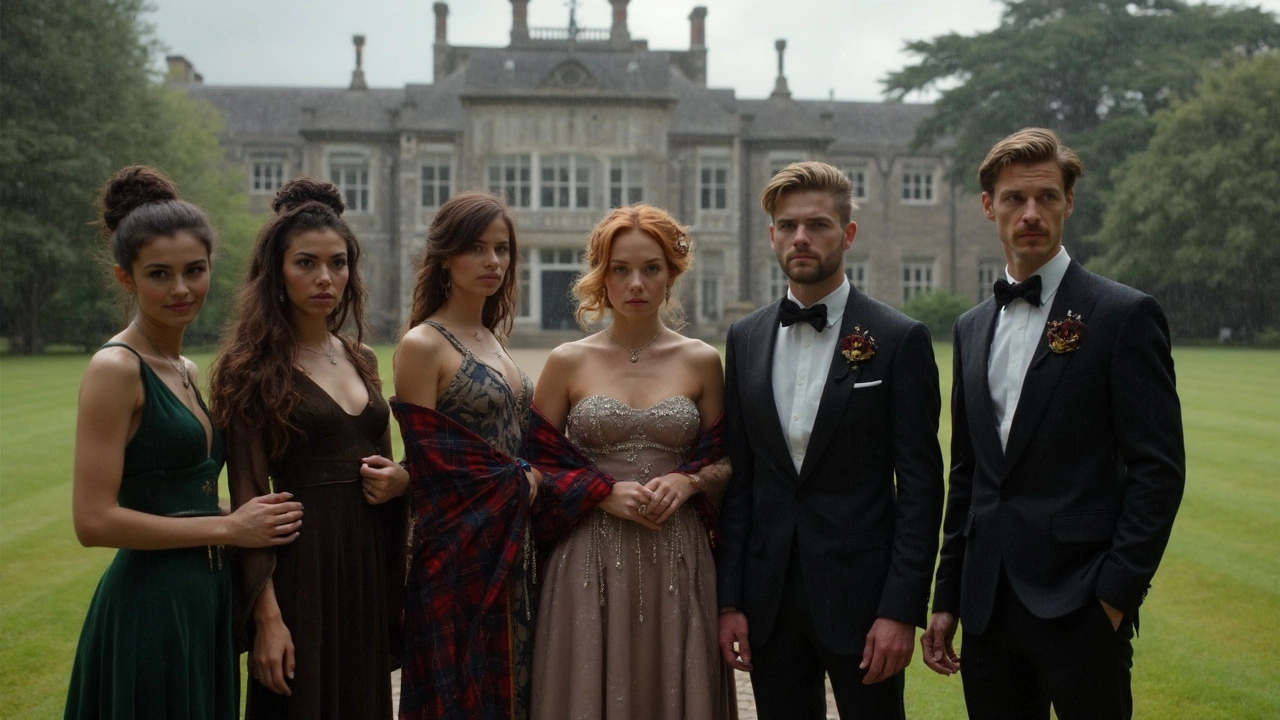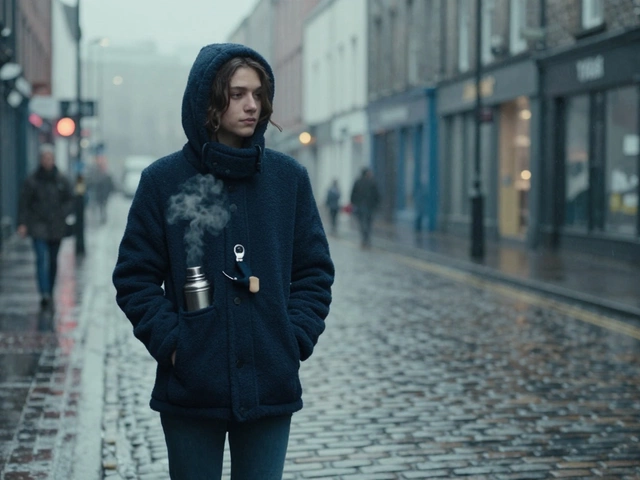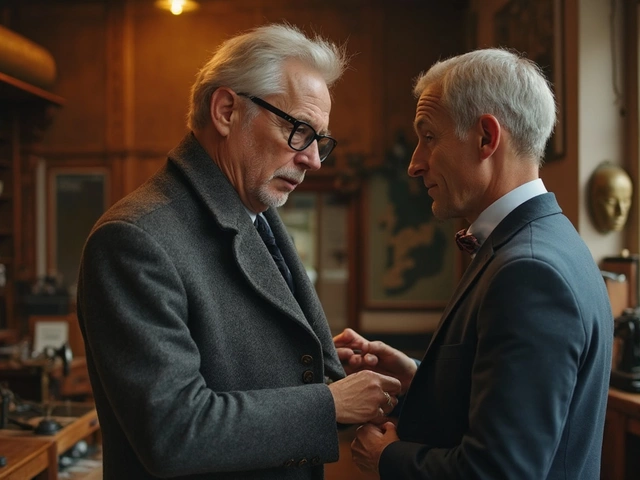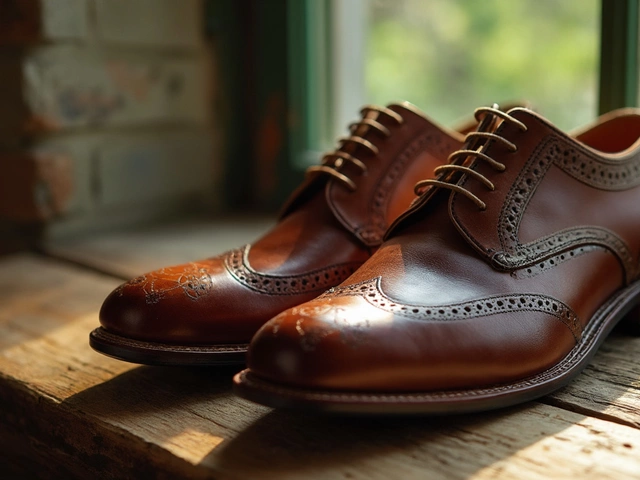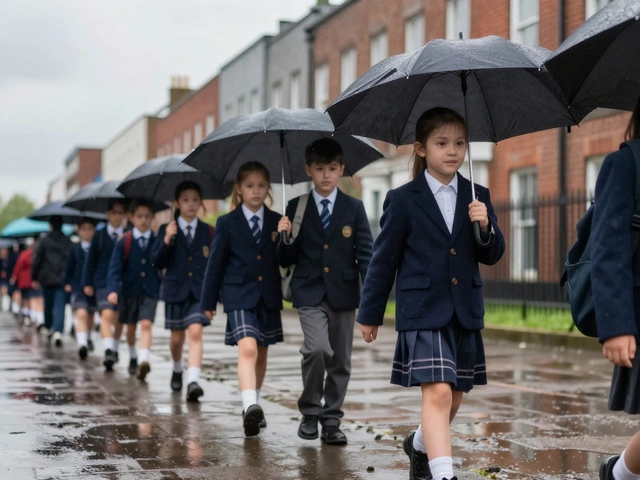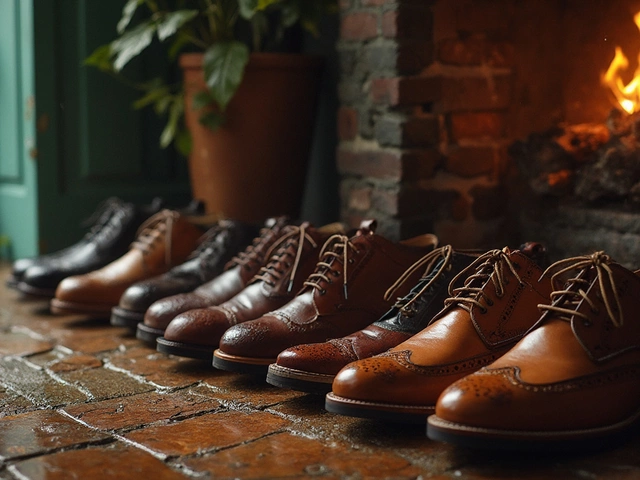If you're trying to figure out what actually counts as an evening dress in Ireland, you're not alone. Dress codes here might sound fancy, but there’s plenty of unspoken rules and real-life considerations that mess with the perfect Pinterest picture. Irish events—think Galway Races, charity galas in Dublin, or big family weddings—often call for something a notch above your typical casual dress, but way less stiff than you might think if you picture old Hollywood movies.
An evening dress, sometimes called evening wear or formalwear, usually means a dress that goes below the knee (right down to the floor for really formal events). Simple cocktail dresses work for most hotel dinners or work dos, but if you’re invited to something black-tie—say, a big fundraiser in Cork or an awards night at The Mansion House—expect to see long gowns, rich fabrics, and a bit of sparkle. But there’s a practical angle too: Ireland's weather loves to throw curveballs. So evening dresses here often come with sleeves, heavier fabrics, and are paired with practical shoes, not just stilettos you’ll regret the next day.
- What Makes an Evening Dress in Ireland?
- Dress Codes and Typical Occasions
- Styles, Fabrics, and What Actually Works Here
- Irish Weather: Choosing for Comfort and Style
- Where to Find the Right Dress Locally
- Quick Tips for Nailing Your Evening Look
What Makes an Evening Dress in Ireland?
So what really sets an evening dress in Ireland apart from just a nice dress? For most Irish events, 'evening dress' means a step up from what you’d wear to dinner or the office. Traditionally, it’s a dress that sits at mid-calf or longer, sometimes all the way to the ankle. For the fanciest events, think floor-length gowns. But don’t get stressed: elegance here is as much about feeling put together as looking like you’ve stepped out of a Vogue shoot.
For Irish women, the line between ‘cocktail dress’ and ‘evening dress’ depends a lot on the occasion. Black tie events, debs, and the charity gala season in cities like Dublin and Belfast usually call for longer dresses and more attention to fabric—velvet, lace, or even heavier crepe get picked during colder months. Meanwhile, wedding receptions or Christmas parties around Cork or Limerick might mean you can go for a shorter hem, but still stay away from anything that looks too ‘workwear’ or ‘daytime’.
Colour matters too. Irish evening events tend to see a sea of classic shades—navy, black, burgundy, emerald green, and deep blues are super popular. You rarely see all-white (except on a bride!), and anything neon might get you some side-eye. Sparkle is welcome, especially for New Year’s Eve, but you’ll notice a lot of people pairing glam dresses with a smart shawl or even a wool coat when heading out.
Let’s talk shape and making sure you don’t freeze. Strapless and sleeveless are fine indoors, but loads of Irish evening wear includes three-quarter or full sleeves, higher necklines, or is paired with a bolero, blazer, or scarf. The unpredictable weather here means people plan for chilly settings, even in fancy places like The Shelbourne or a Cork city venue.
- Length: Midi to full-length is the usual standard.
- Fabric: Think velvet, satin, crepe, lace—sturdy yet chic materials that hold up in Irish weather.
- Details: Beading, sequins, or some subtle shimmer are popular, especially for festive nights.
- Fit: More tailored than day dresses, but comfort always matters—no one wants to spend a night fidgeting.
Quick tip for shopping: Many Irish boutiques carry lines like Fee G, Caroline Kilkenny, and even Irish-designed dresses from Lennon Courtney, which suit evening events and stand out without going overboard.
Dress Codes and Typical Occasions
Dress codes for evening dress Ireland are never just about looking fancy. Different events have their own unwritten rules, and picking the right outfit can save you a lot of last-minute stress. Let's break down the usual suspects on the Irish social calendar and what you’re expected to wear.
- Weddings: Irish weddings are serious business for style. Black-tie weddings, especially in historic hotels like the Shelbourne or Castle Leslie, call for long gowns. For less formal weddings (think country celebrations or small city venues), a chic midi dress works great. Steer clear of white or cream as a guest—unless you want glares from every Irish mammy in the room.
- Charity Balls and Galas: Big fundraisers, especially in Dublin or Galway, usually send out clear instructions. If it’s ‘black-tie’, go long and elegant. These are the nights to pull out deep colours, velvet, and even some sparkle.
- Work Dos: Christmas parties or company awards nights rarely go full formal—mid-length cocktail dresses and jumpsuits are both a safe and stylish shout. If you're in doubt, ask a colleague who's been before.
- Theatre and Opera: Popular venues like the Bord Gáis Energy Theatre or the Cork Opera House set a stylish scene but don’t expect the drama of gowns and tuxes everywhere. A pretty cocktail dress or a sharp suit is more than enough.
- The Races: The Galway Races or Ladies Day at Punchestown are a breed apart. Outfits are more creative—think bold colours, headpieces and posh frocks, but not necessarily floor-length. Weather-proofing is smart: a stylish coat and solid shoes are crucial.
Here’s a quick look at what’s common at popular events throughout the year:
| Event | Common Dress Code | Key Tips |
|---|---|---|
| Black-tie Wedding | Long evening gown | No white, comfy shoes for dancing |
| Charity Ball | Floor-length formalwear | Statement clutch, check cloakroom options |
| Work Christmas Party | Cocktail dress | Keep it chic, nothing too revealing |
| Theatre Night | Knee-length dress or suit | Smart jacket for after-hours chill |
| Galway Races | Bright, standout outfit | Weather-appropriate, fun headpiece |
Knowing the event and how folks generally dress helps you blend in—or stand out for all the right reasons.
Styles, Fabrics, and What Actually Works Here
The world of evening dress Ireland shopping isn’t always straight-up glitz. There’s a knack to picking what works for Irish events—and it comes down to comfort, weather, and current trends. People here rarely go full ballgown or red carpet slinky unless it’s a very posh event. Styles that sell well in Irish boutiques, like Folkster (Kilkenny and Dundrum) or Jennifer Wrynne Boutique in Leitrim, lean towards elegance with real-world practicality.
Let’s talk fabrics first. Heavy materials (think velvet, brocade, thick satin) are safe bets through most of the year, especially for those chilly spring galas or November weddings. Lightweight chiffons or lacey overlays work for summer, but you’ll want a built-in lining or an option to layer—nobody wants goosebumps before dinner’s even started. Most women here add a classic pashmina, tailored blazer, or bolero jacket to the look. It’s rare to see those backless, strappy numbers without someone throwing a wrap over their shoulders halfway through the night.
Styles that always pop up at major Irish evening wear shops include:
- Wrap dresses—flattering, comfy, and easy to adjust if you eat too much banoffee pie.
- A-line and empire-waist dresses—perfect for sitting through a three-hour dinner at the Shelbourne or getting up for Céilí dancing later.
- Sequinned or metallic shift dresses—popular for cocktail parties or awards nights, like those at Croke Park’s corporate suites.
- Long-sleeve gowns with subtle details—like lace cuffs or a bit of sparkle, so you’re warm but still looking glam.
If you’re someone who likes numbers, here’s a quick peek at fabric choices for Irish evening dresses based on a 2024 survey of popular Irish dress stores:
| Fabric | Share of Dresses |
|---|---|
| Satin | 34% |
| Velvet | 20% |
| Chiffon | 18% |
| Lace | 15% |
| Others (crepe, brocade, jersey) | 13% |
And for colours? Emerald green, navy, berry, and classic black are always on the rails—great for blending in or standing out a bit without feeling like you showed up to the wrong party. In the end, practical fashion rules here: the best dress code Ireland tip is to pick what makes you look good, feel good, and survive late Irish nights without freezing.
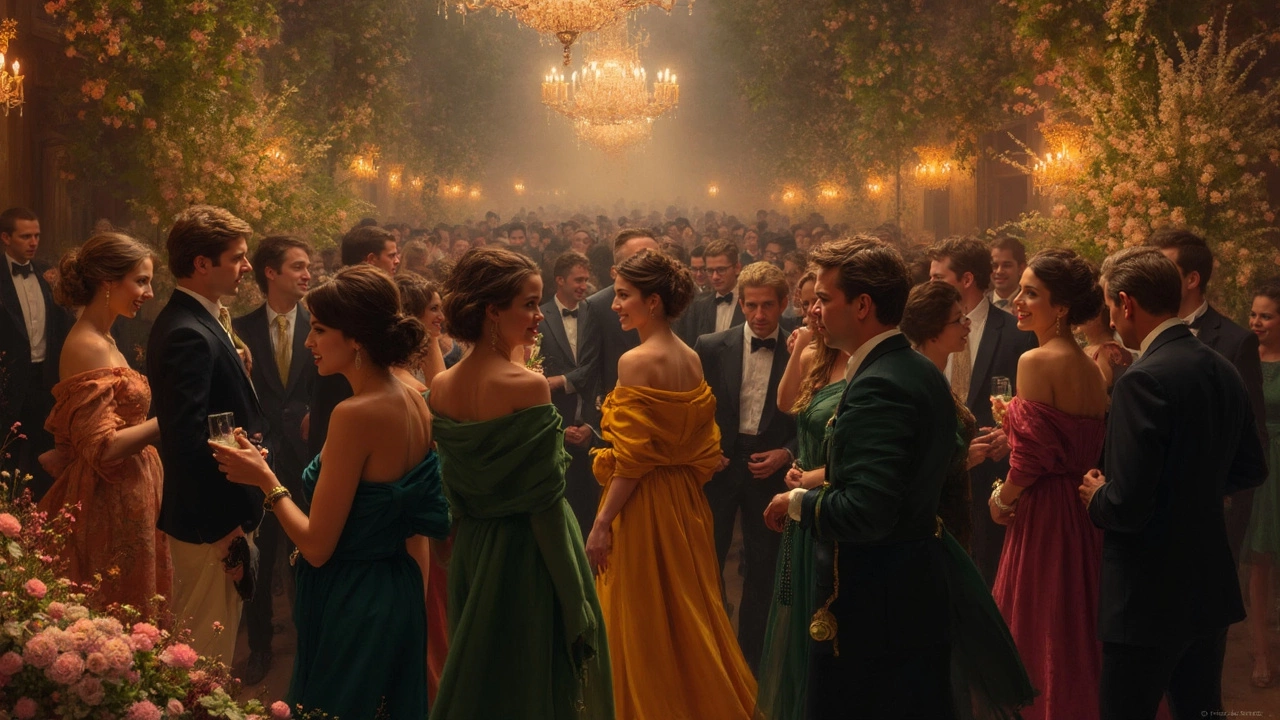
Irish Weather: Choosing for Comfort and Style
Picking an evening dress in Ireland isn’t just about the look—it’s about not freezing, frizzing, or feeling sticky. Anyone who’s ever gone to an event from Donegal to Cork knows the Irish weather can flip in a heartbeat. One minute it’s grand, the next there’s a downpour. The trick is choosing a dress that works whatever the forecast throws at you.
Most Irish evenings, even in summer, lean cool. You’ll rarely regret grabbing a shawl, bolero, or even a tailored blazer that doesn’t ruin the outfit. Three-quarter sleeves are popular for a reason—you get some coverage without looking bundled up. If you’re after a sleeveless or spaghetti strap number, think about layering with a chic wrap from brands like Avoca or Carraig Donn.
Fabric matters a lot. Heavy satins, velvets, or lined dresses help keep the chill at bay. Floaty chiffon looks gorgeous but can leave you shivering outside the cocktail tent at Leopardstown. For outdoor or partially covered venues, choose dresses with a lining or opt for a heavier weave.
Waterproofing your look might sound over-the-top, but many Irish women swear by carrying a small umbrella and choosing shoes you can run in if it buckets down. Heels for the ceremony, then a pair of smarter flats or low-block heels for the walk home—it’s pretty standard, especially at rural hotels or countryside weddings.
| Month | Typical Evening Temperature (°C) |
|---|---|
| May | 8-12 |
| August | 10-14 |
| December | 2-6 |
What does this mean in practice? Don’t bank on balmy nights. Light layers, sensible footwear, and smart fabrics will mean you actually enjoy the event, not just grin and bear it. Honestly, folks here remember the clever dresser who looked great and kept warm—much more than the person shivering in a slip of a dress by the smoking area.
Where to Find the Right Dress Locally
Hunting for an evening dress in Ireland is a lot easier than it was even five years ago. These days, you’ve got proper choice whether you’re in Dublin, Cork, or a small town up north. Irish shops carry a good mix of international brands and local designers, giving plenty of options for every budget and occasion.
If you want a really wide selection, Brown Thomas in Dublin and Cork has all the big names—think Phase Eight, Reiss, and Irish favourites like Fee G. These stores get new collections every season, so you’re not picking over last year’s styles. For a personal touch, try Irish boutiques like Fran & Jane or Bow & Pearl in Blackrock, which specialise in formalwear and are known for friendly, no-nonsense advice.
Rental is now a big thing, too. Borrower Boutique and Rag Revolution both let you rent a stand-out dress for a night, which is a lifesaver for one-off events. Renting is often half the price (or less) of buying brand new, and you don’t have a dress hanging in your wardrobe afterwards that you know you’ll never wear again.
Online shopping is part of the mix. Littlewoods Ireland, ASOS, and Folkster ship quickly across the country, but it’s smart to check return policies—sizing can be odd, and Irish postage isn’t always as fast as UK sites say. Folkster, based in Kilkenny, actually started as a bridal shop but now does gorgeous Irish evening wear in sizes up to 22 and they’ll even help you in person at their shop.
Here are some solid tips for finding the perfect dress locally:
- Check what shops are in your area and call ahead. Some boutiques let you book private fitting appointments, especially around busy times like before Christmas or school debs.
- Mind your timeline: If you’re going custom or getting alterations, give it at least 4 weeks.
- Don’t be shy asking about rental—boutiques are getting used to it and often have deals on high-end formal events Ireland dresses.
- Look out for pop-up sample sales. Dublin and Galway often host these in spring and autumn with huge reductions on last season’s stock.
It’s not just about fancy stores. Dunnes Stores and Marks & Spencer add smart new pieces every season that work for family parties or smaller events—and you’ll find them all over Ireland.
Mairead Fanning, owner of Fran & Jane, says: "Irish women don’t want to feel overdressed or underdressed—they want something that feels like ‘them’ but a bit more special. We always say, if you’re comfortable and feel great, you’re halfway there already."
| Shop | Location | Best For |
|---|---|---|
| Brown Thomas | Dublin, Cork, Limerick, Galway | Big brands, premium selection |
| Bow & Pearl | Blackrock, Dublin | Boutique service, personal styling |
| Borrower Boutique | Online, Dublin | Dress rental, one-off events |
| Folkster | Kilkenny, Dublin, Online | Trendy Irish evening wear |
| Dunnes Stores | Nationwide | Affordable options, everyday wear |
Whatever your style or budget, there’s no shortage of local options to get you sorted for your next big formal event in Ireland. Try on loads, ask questions, and don’t be afraid to mix high street with a splash of designer or a clever rental. That’s the real Irish way.
Quick Tips for Nailing Your Evening Look
Getting your evening dress Ireland vibe right isn’t about blowing the budget, but it does take a bit of planning. Here’s how you can sidestep wardrobe regrets and actually enjoy your night out.
- Think Practical, Not Just Pretty: Irish weather is famously indecisive. Even in summer, evenings get chilly. Bring a pashmina, light tailored jacket or even a classic trench if there's rain on the cards. A shivering look is never a win.
- Dress Code Reality Check: If the invite says ‘black tie’ or ‘formal’, you’re safe with a full-length gown. For hotel dinners or work dos, a chic midi or structured cocktail dress is usually perfect. Rural weddings and smaller towns might lean slightly more relaxed, but city galas mean more glam.
- Don’t Ignore the Shoes: Events in places like the Royal Hospital Kilmainham or outdoor marquees at hotels near Lough Eske mean gravel, lawns, or cobblestones. Chunkier block heels, wedges, or even sparkly flats are smart options. Bring plasters, just in case—that’s nearly a local tradition at this stage.
- Local Boutiques Know Their Stuff: Shops like Folkster (Kilkenny & Dundrum), Fran & Jane, and Divas (Limerick) are well clued-in to Irish tastes and events. They won’t blink if you ask for a dress with sleeves or thicker fabric for March events—they get it.
- Accessorise for a Polish, Not Overkill: One statement bit—like earrings or a metallic clutch—from Irish designers like Chupi or Juvi adds personality. Skip the tiara unless you’re actually at the Rose of Tralee final.
- Don’t Ditch Comfort: You’ll usually wear your evening dress for hours, so if it’s digging in, rides up or threatens to slip, swap it. Confidence beats fussing under the table any day.
Fun fact: In a recent RSVP Live survey, 67% of Irish women said they’d rather wear a dress with sleeves to a winter event, just for warmth and comfort. You’re definitely not alone if you feel the cold or want to keep things low-key.
| What to Double Check Before Leaving Home | Why? |
|---|---|
| Weather forecast | Rain or chill changes everything |
| Shoes | Check if you’ll be walking on grass or cobblestones |
| Dress code | Don’t wing it—ask the host if you’re unsure |
| Comfort | You’ll look better if you feel good |
Most nights out will have phones snapping, so try your full look in daylight before heading out. Top tip: take a quick photo in your full outfit—lighting at home is way less forgiving than in a dark ballroom. That’s how locals avoid fashion surprises on Instagram the next day.
